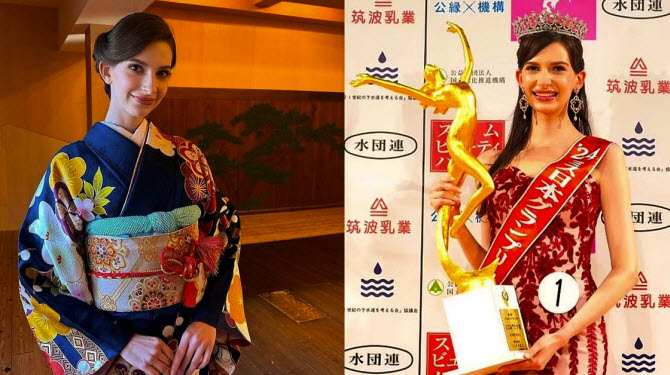
The announcement of Carolina Shiino, an ethnic Ukrainian woman, as Miss Japan 2024 has ignited a lively debate in the country, shedding light on persisting racial barriers and perceptions of Japanese identity.
Crowned with tears of joy on Monday, the 26-year-old model, who relocated to Japan at the age of five and was raised in Nagoya, expressed the challenges she faced in gaining acceptance as Japanese. Despite her deep connection to the country, the fact that she is not ethnically Japanese has triggered criticism from some quarters, reflecting a sentiment that contests her suitability for the title of Miss Japan.
Critics have voiced concerns about Shiino’s lack of a Japanese accent and her 100 percent Ukrainian ethnicity. Discontent has been articulated through social media, with comments questioning the essence of “Japaneseness” in the context of a beauty pageant that traditionally represents Japanese identity. Some argue that if she were of mixed heritage, there might be less contention, but the absence of Japanese ethnicity in her background has raised eyebrows and sparked a broader conversation about the definition of national identity.
One social media user questioned the choice, emphasizing the potential impact on Japanese perceptions: “She doesn’t even have a Japanese accent but is 100 percent pure Ukrainian. I understand she’s beautiful, but this is ‘Miss Japan’. Where’s the Japaneseness?”
Amid the controversy, others speculate about the potential political motivations behind Shiino’s selection, pondering whether her Ukrainian origin influenced the decision. Some critics argue that her victory might not have been possible if she were born Russian, suggesting a political dimension to the pageant outcome.
In response to the criticism, Ai Wada, the organizer of Miss Japan, expressed full confidence in the judges’ decision. Wada highlighted Shiino’s proficiency in Japanese, both spoken and written, asserting that she embodies Japanese identity in a meaningful way. Wada contends that Shiino’s deep connection to Japanese culture, despite her Ukrainian ethnicity, makes her more Japanese in a cultural sense.
Shiino herself, reflecting on her journey to receiving Japanese citizenship last year, acknowledged that she may not look Japanese but emphasized her mental assimilation into Japanese culture through growing up in the country. As the debate continues, the Miss Japan pageant has become a focal point for discussions on cultural identity, inclusion, and the evolving definition of what it means to be Japanese.
RELATED ARTICLES
- Mayo Clinic Says Racism Causes African Americans to Have Heart Attacks
- UK Woman Charged with double attempted murder after Poisoning her own Children
- Infant Drowns in 3 Inches of Bathwater as Mom Faints
- Japan suspends Moderna Covid vaccine after another million doses found contaminated, bringing total to 2.6 million
- More people Suicide in Japan because of the Restrictions than the Virus Total Death Toll












This seems to suggest that at least some aspects of Japanese society are being stealthily overtaken by activists and cultists. While a foreigner winning a beauty contest may not seem particularly unusual to Occidental audiences, it’s probably closer to a man being crowned “Miss Anything” in terms of how it is perceived in a monoculture like Japan.